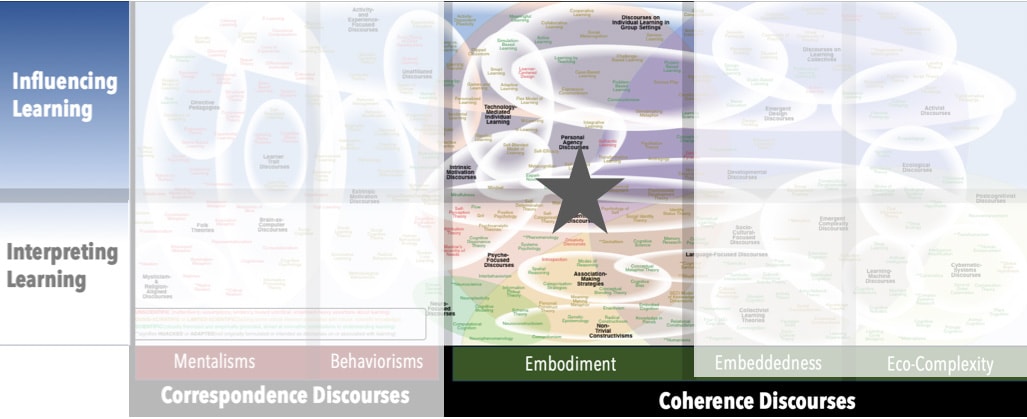Focus
Understanding biological bodies as integrations of mental and physicalPrincipal Metaphors
- Knowledge is … scope of possible actions and interpretations
- Knowing is … appropriate functioning
- Learner is … a bodied agent
- Learning is … selecting, blending, and refining possibilities
- Teaching is … designing experiences (orienting, juxtaposing)
Originated
early-1900sSynopsis
Embodiment Discourses is a sub-category of Coherence Discourses. It is an umbrella term that reaches across perspectives on learning that refuse a separation of mind and body. Rather, mental and physical are understood as integrated and inseparable aspects of one’s being. Phrased differently, behaviors are not seen as goals or indications of learning, but as integral elements of learning. Embodiment Discourses typically are oriented to adequacy and assume evolutionary dynamics, as exemplified by principles that include:- Satisficing (Herbert A. Simon, 1950s) – a portmanteau of “satisfying” and “sufficing,” referring to a mode of operating that is based on “being fit” within a context (e.g., sufficient, good enough, collaborating/cohabiting with) rather than “being fittest” (e.g., optimal, most capable, eradicating competition)
- Enfleshment (1980s) – a variously interpreted term that entered the educational literature as a synonym for Embodiment, but that is increasingly used to span sensibilities associated with Embodiment Discourses, Embeddedness Discourses, and Eco-Complexity Discourses. In particular, Enfleshment is coming to be associated with rejections of not just such dichotomies as mind/body and individual/collective, but also human/more-than-human, animate/inanimate, and sentient/mechanical.
Commentary
Different Embodiment Discourses attend to, grapple with, and prompt different issues – and so it doesn’t make much sense to attempt a general commentary. There are few robust criticisms of Embodiment Discourses, as most negative remarks are anchored to deep-seated metaphysical assumptions that rely on such dichotomies as mental/physical, thought/action, and internal/external.Subdiscourses:
- Enfleshment
- Satisficing
Map Location

Please cite this article as:
Davis, B., & Francis, K. (2023). “Embodiment Discourses” in Discourses on Learning in Education. https://learningdiscourses.com.
⇦ Back to Map
⇦ Back to List
